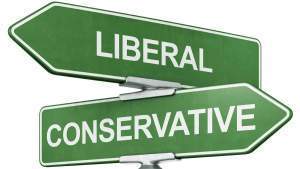What if everyone is a little bit liberal?
I’m quite impressed that the theme of this young adult group at my church is addressing tough questions: the aspects of our Christian faith that don’t make a lot of sense. Sitting at a table last week, we were all supposed to name something that we struggle to understand: for some, it was creationism vs. evolution. For others, the permissiveness of suffering, the inerrancy of the Bible, and whether miracles still happen.
By the time my turn came, I was surprised I was the first to mention hell. I couldn’t have been the only one thinking about it. In less than sixty seconds, I talked about the highlights of a blog post by my friend Neil, which has stuck with me, and bothered me, because what he has to say about reconciling hell’s existence with a good God makes sense to me. It bothers me because I agree with him on many levels, and I can’t help worrying that agreeing (or at least understanding his points) is the beginning of the unraveling: if hell makes no sense, if a God who doesn’t do away with such a place altogether makes his character questionable, does that mean the entirety of my faith falls apart?
When I was done speaking, I noticed the perplexed looks on people’s faces. “That’s interesting,” one said. “I never thought of it like that before…” Others nodded in agreement, and I started to feel sick. Clearly, I had just burst some kind of bubble, and I actually feared that I had accomplished the exact opposite of the Great Commission: Oh shit, I just deconverted an entire table of Christians into atheists.
Pretty sure that didn’t happen, but my next fear was just as ridiculous: What if they now think I’m a liberal Christian???
All through college, the phrase “liberal Christian” pissed me off and seemed like an oxymoron. Christianity is about a “narrow path,” for crying out loud; Jesus said so himself. What is “liberal” about that? To me, “liberal” implied making it up as you go along, cutting out parts that don’t make sense and rendering them useless and irrelevant. “Liberal” implied a desire to worship one’s self as a god.
But just as my definition of feminism underwent a drastic makeover, so too is my definition of this L-word that seems to drive so many Christians into a paranoid frenzy. If I am liberal, it simply means I am open to hearing alternate viewpoints. It means I’m willing to consider the possibility that I could be wrong about many things (though I certainly hope I’m not, but compared to centuries of scholars, let’s face it: I’m really not that smart).
This isn’t to say I no longer hold any firm convictions. In fact, anyone who “accuses” me of being liberal might be surprised to find out that I’m still adamantly pro-life (which is entirely different from being “pro-birth”), believe marriage is the ideal context in which to have sex, and I still inwardly chafe at the idea that “all religions are the same.” If both Muslims and Christians believe non-believers are destined for hell, they are not at all the same, despite similar teachings about how to treat our fellow man. Clearly, I’m not an easy person to categorize. But I don’t know anyone who is.
I read the blogs of popular evangelicals like Rachel Held Evans, and cringe at the criticism that she’s “too liberal” to be considered a leader in the faith, when my takeaway from her posts is that she’s simply unafraid to ask questions and address topics that many of us are thinking; we just can’t say them out loud because God forbid our faith is tainted “liberal.” It’s practically a death sentence, a label equivalent with heresy.
What is the opposite of being “liberal,” anyway? Conservative? Intolerant? Closed-minded? How are these terms to be used when they seem to be constantly in flux?
I’ve never met a person who doesn’t experience doubt and uncertainty every now and then, even if they hesitate to admit it. In this sense, we are all just a little bit liberal.
Filed under: Religion Tagged: Christian culture, Christianity, evangelicals, hell





